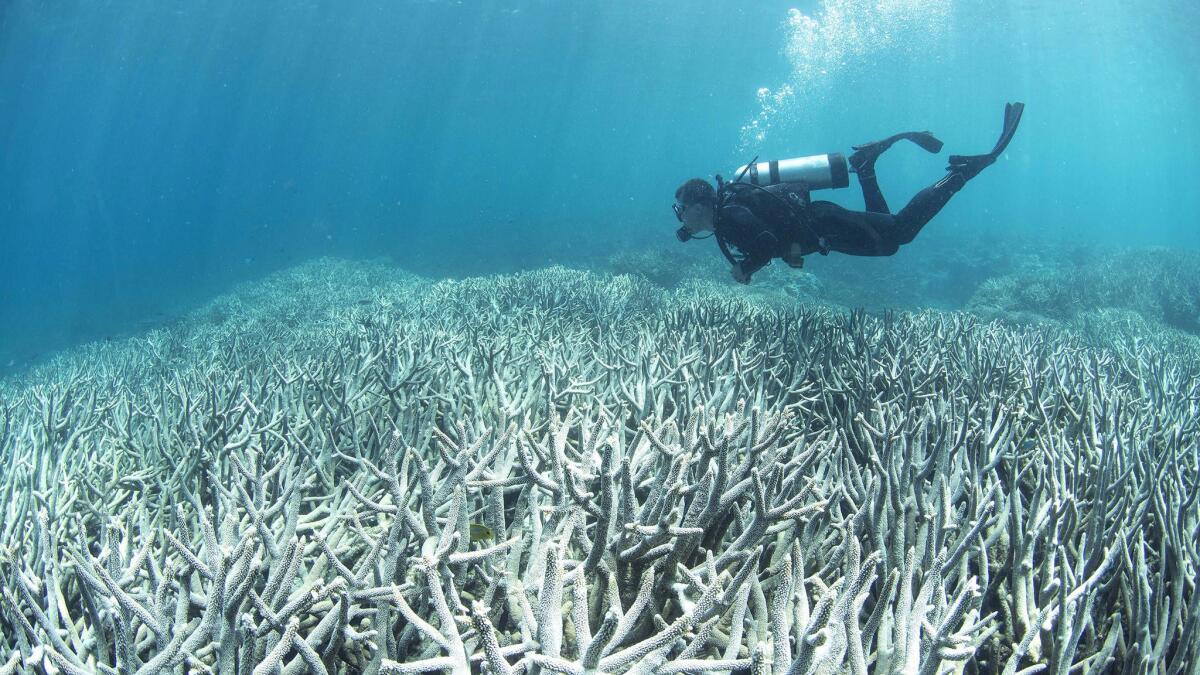Scientists call for urgent action to save the world’s coral reefs

Reporting from HONOLULU — As the largest international gathering of coral reef experts comes to a close, scientists have sent a letter to Australian officials calling for action to save the world’s reefs, which are being rapidly damaged.
The letter was sent Saturday to Australian Prime Minister Malcolm Turnbull imploring his government to do more to conserve the nation’s reefs and curb fossil fuel consumption.
The letter, signed by past and present presidents of the International Society for Reef Studies on behalf of the 2,000 attendees of the International Coral Reef Symposium that was held in Honolulu this week, urged the Australian government to prioritize its Great Barrier Reef.
See more of our top stories on Facebook »
“This year has seen the worst mass bleaching in history, threatening many coral reefs around the world including the whole of the northern Great Barrier Reef, the biggest and best-known of all reefs,” the letter said. “The damage to this Australian icon has already been devastating…. damage from greenhouse gasses, port dredging and shipping of fossil fuels across the Great Barrier Reef contravene Australia’s responsibilities for stewardship of the Reef under the World Heritage Convention.”
Leaders from the scientific community at the convention in Honolulu said Friday that the “unprecedented” letter was critical to the conservation of the fragile reef habitat.
There’s nowhere to hide from climate change.
— Terry Hughes, James Cook University, Australia
The heads of state from Palau, Micronesia and the Marshall Islands attended the conference and will provide a plan to help save their ailing coral reefs, which are major contributors to their local economies and the daily sustenance of their people.
Bleaching is a process in which corals, stressed by hot ocean waters and other environmental changes, lose their color as the symbiotic algae that live within them are released. Severe or concurrent years of bleaching can kill coral reefs, as has been documented over the last two years in oceans around the world. Scientists expect a third year of bleaching to last through the end of 2016.
NEWSLETTER: Get the day’s top headlines from Times Editor Davan Maharaj »
In the northern third of the Great Barrier Reef, close to half of the corals have died in the last three months, said Terry Hughes of James Cook University in Australia, who focuses his research there. The area of the reef that suffered most is extremely remote, he said, with no pollution, very little fishing pressure and no coastal development.
“That’s an absolute catastrophe,” Hughes said. “There’s nowhere to hide from climate change.”
But the panel’s scientists emphasized the progress they have made over the last 30 years and stressed that good research and management programs for coral reefs are available. The scientists said they just need the proper funding and political will to enact them.
In the United States, the budget for the federal coral reef conservation program is set at about $27 million a year, said Bob Richmond, director of the University of Hawaii’s Kewalo Marine Laboratory and convener of this year’s International Coral Reef Symposium.
In Hawaii, he said, the reefs are valued at $34 billion, and the return to the state’s economy is about $360 million annually — meaning the entire nation’s budget for coral reef conservation is less than 10 percent of the annual return in that one state alone.
Florida, Texas, Puerto Rico, the Virgin Islands, Guam, American Samoa and the Northern Mariana Islands also have ailing reefs under the budget.
ALSO
British scientists are freaking out about ‘Brexit’ too
Kern County residents struggle with devastation wrought by massive wildfire
What’s it like to ride a glass slide 1,000 feet above L.A.? We tried it out
More to Read
Sign up for Essential California
The most important California stories and recommendations in your inbox every morning.
You may occasionally receive promotional content from the Los Angeles Times.










